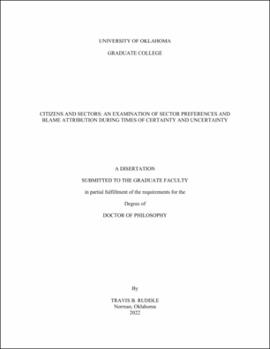| dc.description.abstract | The current era of sector convergence and blurred sector boundaries has important implications for the study of public and private management and how citizens interact, perceive, and experience public service deliveries and hold organizations accountable in multi-sector marketplaces. This dissertation explores the role of sector in citizens’ lives, particularly in their roles as citizen-consumers and citizen-observers, where they experience and evaluate the services provided to them and to others. Central to this over-arching study are individuals’ expanding function in the citizen-bureaucratic accountability chain and when public service deliveries fail to be adequately provided, how do citizens perceive organizations across sectors? Do these overall perceptions and preferences for sector providers vary by sector and to what extent do they change in negative situations such as in a case of an organizational crisis, which initiates a revaluation of an individuals’ expectations and perceptions broadly defined.
While studies have contributed to understanding citizens’ baseline attitudes toward sectors including general and specific ownership types, a comprehensive comparison of sector providers including all three– government (public), private for-profit, and nonprofit organizations has been lacking when compared altogether. Studies have indicated that sector matters to citizens in various contexts and that there may even be biases against or for particular providers, which has deep implications for not only scholars and our understanding of sector theory, but important factors for practitioners in their role to see how citizens view their organization whether favorably or unfavorably across different conditions. This dissertation provides a theoretical framework and a foundation to understanding citizens’ perceptions of sectors and how certain factors can influence individuals’ views and behaviors across various conditions. An experimental survey was employed using Lucid Theorem to investigate citizens’ preferences for public services at a baseline, but further expanding our understanding of how citizens’ preferences change and vary, while additionally examining how citizens blame sector providers when a service delivery failure occurs. This comparative exploration and analysis sector theory interacted with citizens’ experiences makes a prominent contribution to literature on sector theory, democratic and bureaucratic accountability, and blame attribution theory.
Chapter 1 introduces the dissertation through the backdrop of sector blurring and the sector converging that is prevalent today. Chapter 2 provides the theoretical framework of the dissertation. After the theoretical concepts and constructs as well as background information is provided, the following three chapters pivot to empirically examining sectors and citizens’ perceptions. Chapter 3 examines how citizens preferences to sector change when an organizational crisis is introduced and initiates citizens to reevaluate their original preferences. Chapter 4 adds to blame attribution theory studies that have looked at how organizations are blamed differently across sectors. Lastly, in terms of empirical work, Chapter 5 breaks down blame attribution by sector and by role, seeing the effects of citizens’ blame when specific roles are introduced and seeing if blame varies if a particular organizational role increases the distribution of blame as it interacts with sector. The dissertation concludes with a final discussion of the overall findings and provides a foundation for examining sectors and citizens’ experiences moving forward. Ultimately, the dissertation shows that sector does matter to citizens and that individuals to recognize and reevaluate their original preferences and overall perceptions toward sector. Mixed results from previous studies have shown differences in citizens’ understanding of sector, but it should be emphasized that there are reasonable steps ahead to examine these roles across conditions. | en_US |
